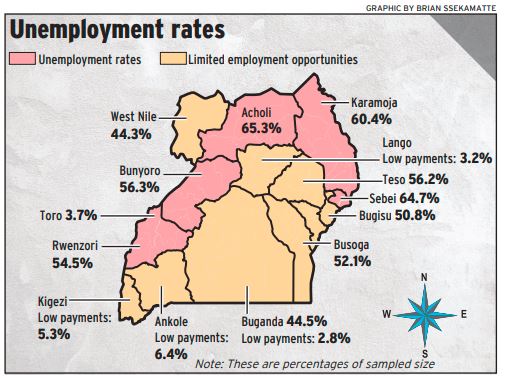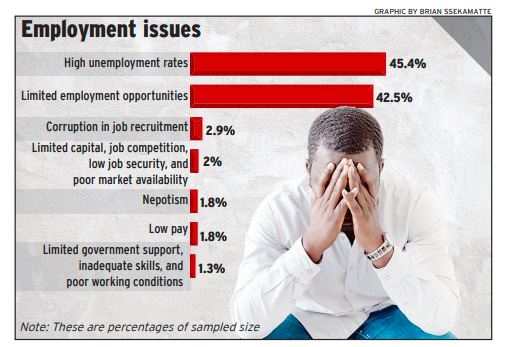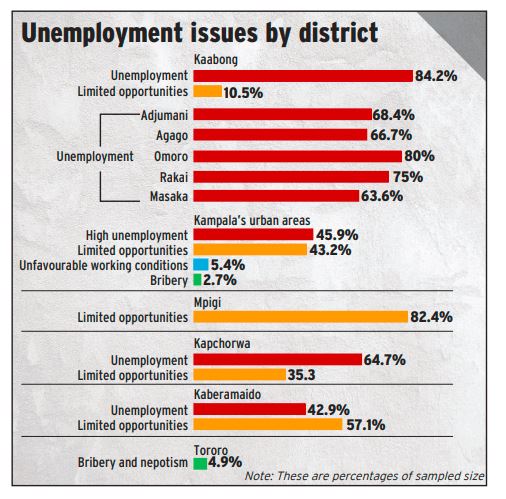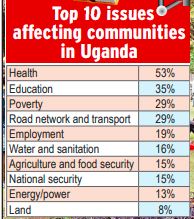Politics
2026 Elections: Voters decry unemployment, limited opportunities
Eastern Uganda leads in limited employment opportunities, with Teso (56.2%), Busoga (52.1%), and Bugisu (50.8%) — all above 50%. West Nile (northern Uganda) is at 44.3%, while Buganda (central Uganda) has 44.5% of respondents saying there are limited employment opportunities.
City dwellers lying idle in a park in Kampala. Several respondents blame unemployment on systemic barriers, including corruption, low wages and poor policy implementation.
By: Ritah Mukasa, Journalists @New Vision

CITIZENS' MANIFESTO
From an early age, Allan Ssembuusi resolved to study hard to get a good job and turn around his family’s fortunes. Born into a humble family in Bukomansimbi district, Ssembuusi’s father was a barber, while his mother was a vendor.
The couple struggled to sustain their six children in school. Ssembuusi hawked sugarcanes, worked as a taxi conductor, houseboy and manicurist to raise his school fees.
In 2020, he joined Makerere University on the students’ loan scheme. He continued working hard, and in 2023, he graduated with a first-class degree in environmental health science.
However, two years down the road, Ssembusi, 27, is jobless. “I was convinced a first-class degree would guarantee me a job, but I was wrong,” he said.
He is among the 25 of 43 former coursemates who are still unemployed. “I was the class co-ordinator and we are still in touch.”
Now volunteering as a research assistant, Ssembusi is aggressively seeking a master’s degree scholarship in the hope that his chances of getting a job will improve.
That is not all. Edrine Muzaaya, 25, employs 45 full-time workers in his cleaning and fumigation company, but he says the majority are certificate and diploma holders who failed to find jobs and, out of desperation, they joined his company.
They clean offices and shopping malls in Kampala. Each worker earns sh350,000 a month, a wage slightly above the Bank’s international poverty line of $3 (about sh10,700) per person per day.

The opinion poll, conducted in all 17 sub-regions across the country, aimed at capturing public sentiment on governance, service delivery and development priorities.
The study reached 6,006 eligible voters through a stratified random sampling method, ensuring demographic and regional balance.
Vision Group poll question
A question was asked: “In your opinion, which issues are affecting this community?” Fifty-three per cent of the respondents cited health services, education (35%), poverty and transport infrastructure (29%), indicating concerns about socio-economic hardships and bad road networks.
Other issues reported include employment/unemployment issues (19%), water and sanitation (16%), food security (15%), national security (15%), energy access (13%), land conflicts (8%).
Of the 19% who mentioned employment issues, 45.4% of them cited high unemployment rates, while 42.5% cited limited job opportunities as a nationwide issue.
Corruption (bribery, nepotism) and low wages are secondary but critical issues. Rural Uganda, which is characterised by young people, is heavily dependent on subsistence farming as the main economic activity.
Kampala’s urban poor, according to 45.9% of the respondents, face unemployment, low wages of about sh10,000 per day and high rent averaging sh200,000 per month, trapping residents in informal labour.
“Job competition is so high, even graduates clean streets,” a Nakawa East resident said.
Employment issues
The primary employment challenges countrywide, according to the respondents, stem from high unemployment rates (45.4%) and limited employment opportunities (42.5%), together accounting for nearly 88% of the responses.
Corruption in job recruitment is a secondary issue with bribery (2.9%) and nepotism (1.8%).
Low pay (1.8%), limited government support, inadequate skills and poor working conditions (each 1.3%) further constrain the labour market. Minor factors such as limited capital, job competition, low job security and poor market availability collectively account for less than 2%.

Youth empowerment and personal attitudes toward work are negligible concerns, suggesting that structural and systemic factors dominate over individual ones.
High unemployment rates
Northern Uganda dominates when it comes to high unemployment rates, with Acholi at 65.3% and Karamoja (60.4%) experiencing particularly severe joblessness. Sebei (eastern Uganda) is at 64.7%, Bunyoro (western Uganda) at 56.3% and Rwenzori at 54.5%.
“It’s very hard to get employed these days, both in the private and public sectors, even if the person has the qualifications,” a respondent in Arua’s Ayiivu East constituency said.
The data shows that even in resource-rich areas like Bunyoro, unemployment is persistently high, suggesting that economic growth there is yet to translate into widespread job creation.
Limited employment opportunities
Eastern Uganda leads in limited employment opportunities, with Teso (56.2%), Busoga (52.1%), and Bugisu (50.8%) — all above 50%.
West Nile (northern Uganda) is at 44.3%, while Buganda (central Uganda) has 44.5% of respondents saying there are limited employment opportunities.
While unemployment rates are extremely high in the north, job scarcity as a primary barrier is more dominant in the east.
Central Uganda, despite being economically vibrant, still records notable constraints in job creation, particularly in Buganda (44.5%).
Low payment on jobs
Respondents also cited the highest prevalence of low wages as another employment issue. Western Uganda has a wage challenge, with Ankole (6.4%) and Kigezi (5.3%) at the top.
Northern Uganda’s Lango has 3.2%, Toro in western Uganda (3.7%) and Buganda (2.8%).
Therefore, even where jobs exist, they may not provide adequate income to improve the standards of living.
Northern Uganda faces the highest unemployment rates, but not necessarily the most limited job opportunities, implying that even when jobs exist, they may be inaccessible or mismatched to the skills available.

Eastern Uganda has the greatest scarcity of job opportunities, which suggests that there is structural underdevelopment and fewer formal employment sectors.
Western Uganda shows a wage quality problem, meaning job creation is not translating into decent income levels.
However, central Uganda presents a mixed picture with relatively lower unemployment compared to northern/eastern, but persistent job scarcity in Buganda and wage concerns in some districts.
Systematic failures and corruption
It is worth noting that several issues have contributed to the unemployment problem in the country, including corruption through bribery and nepotism in hiring.
There is also poor planning and mismanagement, making government initiatives unsustainable.
Despite the high entrepreneurship rates, most businesses fail in a year, partly due to lack of mentorship, the high cost of doing business, which some observers say includes high rent fees and tax burdens.
Despite the Lord’s Resistance Army war in northern Uganda, the region is still reeling from the effects of the conflict, which likely compounds the unemployment problem.
Several of the respondents under employment/unemployment blame systemic barriers, including corruption (bribery and nepotism), low wages, and poor policy implementation.
In Fort Portal city’s Central division, a respondent blames laziness on the state of affairs, “which has resulted in sex work”. Respondents in Jinja district’s Kagoma North and Bukoto Mid-West constituency in Lwengo district said decent lives had become a luxury because of unemployment and underemployment.
Others said economic mismatches were responsible for the unemployment in the country.
Since rural areas rely on agriculture, for instance, Teso sub-region’s 49.3% respondents linked unemployment to climate-affected farming, while urban centres like Kampala city face high rent and informal labour.
“Youth work as bodaboda riders due to job scarcity,” a respondent said.

Unemployment is a structural crisis
The 2024 census report, released this year, indicates that 1.4 million Ugandans in the working age group were unemployed.
To Deo Kalikumutima, the chief executive partner of Kalikumutima & Company Advocates, the unemployment problem persists due to mismatches between the skills imparted by the education system and the demands of the evolving labour market.
Worse still, thousands graduate each year, but the economy is not creating enough jobs. This leaves many young people frustrated and helpless.
“I have experienced the emotional toll and weight that comes with being unemployed,” Kalikumutima says.
Aside from the sleepless nights after graduation, some people walk long distances to follow up on opportunities, and brave systemic nepotism, tribalism and ‘experience traps’. “It is a painful and dehumanising experience that many young people endure silently."
Unemployment and COVID
A report by the National Planning Authority (NPA) reveals that despite the Ugandan economy generating 1.6 million jobs between 2016 and 2021, youth unemployment rose from 13% in 2016/17 to 16% in 2020/21.
The most affected demographic is the so-called NEETs: Youth not in education, employment, or training — whose numbers have surged from 2.5 million in 2012/13 to 4.2 million in the 2022/23 financial year.
If the current trends persist, the number is projected to rise to 5.8 million by 2030/31, the report warns.
Regionally, the highest concentrations of NEETs are found in Bukedi (61.4%), Lango (49.3%), Elgon (44.1%), Busoga (43.5%), Bunyoro (42.5%), and Kigezi (42.1%).
The report attributes the trend largely to the economic disruptions caused by the COVID-19 pandemic, which led to mass layoffs and slowed economic growth.
Initiatives and mindsets
Experts propose several interventions, including industrialisation, education reforms to align vocational training with market needs, skilling initiatives and mindset shifts.
Mindset change and volunteering
Law Students Association of East Africa president Gideon Mwanje partly blames unemployment on mindsets. He says many young people put money ahead of everything.
They refuse to volunteer or do pro bono, yet, through those avenues, one can get a job easily. For example, while still in school, Mwanje volunteered at a law firm, and when it was recruiting, he was considered first.
He has also attended over 70 career guidance sessions in different secondary schools around the country, but the most prevalent question students ask is: How much do lawyers or engineers or surgeons earn?
This explains why some jobs are more flooded than others. For example, over 1,400 doctors recently applied for just 16 vacancies advertised by the Health Service Commission, whose chairperson, Dr Henry Mwebesa, said nearly half were disqualified for missing mandatory documents like practising licences, identity cards or academic transcripts.

Gideon Mwanje
Stop the handouts
Willy Mutenza, a business development consultant and the chairperson of UK-Africa Business Summit, wants leaders to stop giving handouts because they breed dependency.
“Instead, that money should be invested in cottage industries, export market research and products where Uganda holds a competitive edge such as coffee, tourism and agribusiness. To Mutenza, sustainable employment “will be generated if we focus on scalable and productive sectors.”
“Similarly, the Government should redirect wasted resources from ineffective schemes like Operation Wealth Creation and Emyooga into setting up export-oriented manufacturing plants, particularly in agro-processing, Mutenza says.
Earning from your talent
Mwanje believes that many jobs can be created if the country invests in talent development.
Katharine Whitehorn, a British journalist, said: “Find out what you like doing best and get someone to pay you for doing it.” Els Mulindwa attests to this.
He believes unemployment persists due to a system that teaches young people to only chase white-collar jobs. This is worsened by a lack of practical mentorship programmes.
“We have to build platforms that focus on skills, creativity and real opportunities,” Mulindwa says.
In the same way, learners should be helped to identify and develop their passions. However, to Mwanje, creating jobs is one thing and sustaining them is another. He says many Ugandans start businesses but they are suffocated by taxes.
“A two-year tax holiday isn’t a handout, it’s a lifeline that allows the enterprise to grow and truly contribute, instead of crumbling at birth,” Mwanje says.
“If we can give it to foreign investors, what about us the citizens?” The 2019/2020 Global Entrepreneurship Monitor ranked Uganda as one of the most entrepreneurial countries globally, with 30% of its adult population starting businesses each year.

The working poor
What is more concerning is that many young people work but remain poor. The majority are engaged in precarious, low-paying jobs with little or no social protection.
The Uganda National Household Survey 2019/20, put the working poor at 8.3 million people (20.3%), with many living below the poverty line. Many of them end up seeking greener pastures abroad.
For example, in 2022, there were 84,966 Ugandans who travelled to the Middle East for work, according to a report by the labour ministry.
It is also estimated that at least 165,000 Ugandans are employed in various sectors in the Middle East, according to the Uganda Association of External Recruitment Agencies.
To nip unemployment in the bud, Kalikumutima suggests realigning technical and vocational education with the market trends.
Most importantly, the Government must create an enabling environment that supports private sector growth.
Liza Sekaggya, a human rights lawyer based in Geneva, Switzerland, says Uganda’s young population can be leveraged to achieve national development.
Without real investment in youth employment, she says: “We risk widespread disillusionment, social unrest and vulnerability to addiction, crime and radicalisation.”
Idle youth are not just a wasted resource, they are a warning signal.
“We must recognise the strong link between unemployment and instability, and treat youth employment as a national security issue,” Sekaggya says.
She roots for systems that support all young people, regardless of background, to access training, internships and job opportunities.
Sustainable job creation
The recently rolled out Fourth National Development Plan prioritises job creation and wealth creation through sustainable industrialisation, aiming for inclusive growth.
It focuses on value addition in key sectors like agriculture, tourism, minerals and oil and gas, along with investments in infrastructure (like railways and the Greater Kampala Metropolitan Area), and skills development, particularly for youth and women in agro-processing.
Initiatives such as the Parish Development Model, Operation Wealth Creation, Emyooga and the Youth Livelihood Programme are intended to generate employment.
Other sweeteners, such as tax breaks and land offerings, are given on the premise that companies will offer employment opportunities to Ugandans.
However, the Uganda Bureau of Statistics says over 80% of Uganda’s workforce remains informal.
The Economic Policy Research Centre says to achieve sustainable development, there must be an intentional balance between job quantity and quality. Policymakers need to consider various approaches.
“The informal sector, while key to Uganda’s economy, operates largely outside labour regulations, exposing workers to exploitation. Providing incentives such as tax breaks, financial aid and business training can encourage small enterprises to formalise”.
The research centre also calls for stronger enforcement of the employment laws and regulations to help ensure fair wages, workplace safety and workers’ rights and bridge the gap between informal and formal employment.
Investing in sectors which employ many Ugandans, such as agriculture and textiles, can generate large-scale jobs with better pay and security.
Increasing the number of industries, modernising infrastructure, ensuring a reliable energy supply, and business hubs will attract private-sector investment, facilitating the creation of formal jobs that offer competitive wages and long-term stability.
SMEs account for over 80% of private-sector employment in Uganda but face significant obstacles.

Investing in sectors which employ many Ugandans, such as agriculture and textiles, can generate large-scale jobs with better pay and security.
Where are the jobs?
The National Employment Strategy 2023-2028 and the Action Plan 2023-2025 by the labour ministry show that agriculture, forestry and fishing remain the largest sectors, with 3,670,366 jobs in 2021, followed by trade with 2,239,104 jobs.
Human health and social work activities, as well as public administration, had the fewest jobs (219,912) each. Estimates from the Petroleum Authority of Uganda indicate that oil and gas will be vital in providing employment opportunities to Ugandans.
By December 2023, about 13,067 people were employed. Of these, 90% were Ugandans and 4,595 were from host communities.
Benard Mujuni, the equity and rights commissioner of the labour ministry, says the Government is tackling unemployment through an approach focused on skills development, entrepreneurship and social inclusion.
President Yoweri Museveni, in July, urged Ugandans to take PDM seriously because of its huge potential to get them out of poverty and generate more employment opportunities than the government can provide.
“There are more jobs in the private sector than in the government, because the government jobs are 480,000. The population of Uganda is 46 million. So, how can they be satisfied? The people who are doing the PDM are already employing people,” President Museveni said.
Skilling initiatives
Investing in digital infrastructure and skills development is crucial for Uganda’s future because it faces the challenge of increasing the number of jobs in the more productive sectors, shifting people out of agriculture into services and industry, while at the same time putting in place interventions which will enhance productivity in agriculture.
The business, technical and vocational education and training sector has the potential to provide the largest number of skilled employees to increase Uganda’s productivity.
However, the sector has suffered from weaknesses. Despite this, the Government has been at the forefront of putting in place several skilling programmes.
These include:
• 20 zonal industrial hubs across the country
• The Presidential Initiative on the Skilling the Girl/Boy Child project
• The Uganda Skills Development Project
These programmes focus on providing practical, marketable skills to the youth, to foster self-reliance and entrepreneurship.

What expert says
If one cannot volunteer, then Prof. Mesharch Katusiimeh calls for flexibility, saying: “Find something to do as you wait for your dream job.” Katusiimeh is the Kabale University faculty of social sciences dean and the director of Rwebiita Preparatory School in Sheema district.
He believes that unemployment in Uganda can be eradicated. “What we need is a cultural shift, policy alignment and practical education that empowers young people to create, innovate and adapt.
The journey may be long, but with determination and the right mindset, Katusiimeh says more Ugandans will be job creators.
The negative attitude towards certain jobs, too, should change. Katusiimeh says there are jobs in agriculture and hospitality, but youth shun them. They migrate to towns in search of office jobs. This urban bias increases pressure on limited formal employment.
What citizens say
Hasina Zawedde, Chairperson Wandegeya Women Traders Co-operative society:
We are over 100 vendors and hawkers in this group. Some are educated but they failed to find jobs and are now hawking fruits and other groceries but street life is distressing.
Government should get us a permanent market where we can settle and grow our businesses.
Erias Mufungiza, Volunteer, Iganga:
Jobs are scarce yet education is expensive and the cost of living is high. I returned to school at 54 years, sat my O’ and A’levels hoping to find a decent job in vain. My children are also jobless. I am now doing a building and construction course. Government should invest in capacity building and train people to create jobs.
Julius Atuhaire, Farmer in Kabale district:
Unemployment is a crisis in Kabale. Many educated young people are now riding bodabodas.
Parents are also frustrated because some took out loans to educate their children. I encourage the jobless youth to embrace agriculture. Farmers are always busy. Start small and grow.